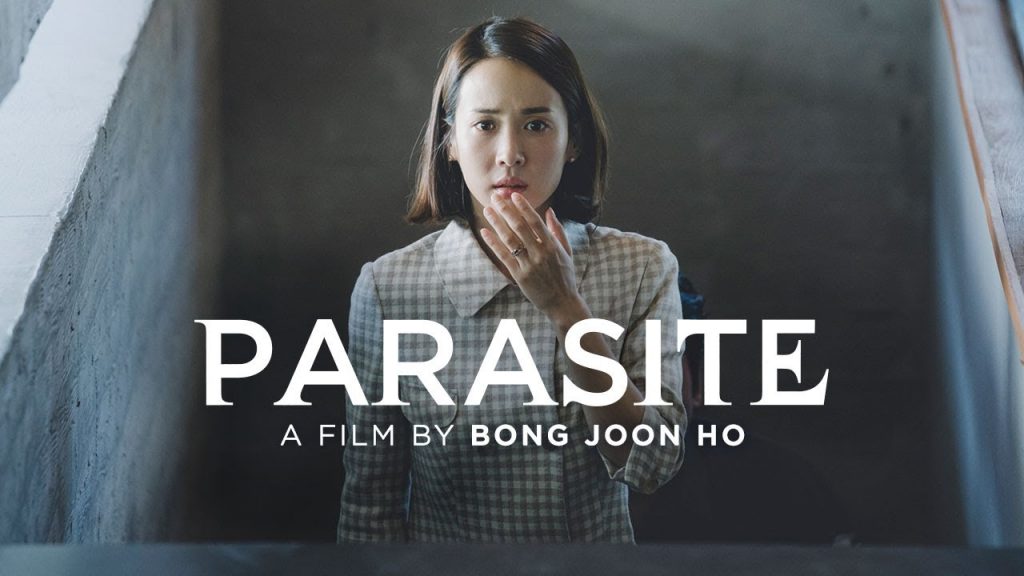
 Bong Joon-ho’s tragicomic thriller swept the last award season and became the first non-English film to win the Oscar for Best Picture. We missed it at release, but now that the dust has settled and it’s available for home viewing, does the film hold up to its accolades?
Bong Joon-ho’s tragicomic thriller swept the last award season and became the first non-English film to win the Oscar for Best Picture. We missed it at release, but now that the dust has settled and it’s available for home viewing, does the film hold up to its accolades?
Yes. Unequivocally so. I can’t beat around the bush – Parasite is a breath-taking film that everyone should see. For those who aren’t familiar with the basic premise, Parasite follows the destitute Kim family as they scheme their way into the service of the wealthy Park family. Going into any further detail on the story would ruin many of Parasite’s great twists and revelations, which serve a plot that leaves you utterly breathless as you struggle to predict where things could possibly go. I was thankfully given the advice to know as little as possible about Parasite before going in, and I am appreciative of that in how it allowed the film to floor me as it progressed. Wanting to maintain this advice does put me in a difficult spot as a reviewer, however! I am desperate to go into the depths of the story, discuss the shocking turns it takes and what the film says as a result. But to do so would rob the discovery from readers yet to see the film, so I will keep things as vague as I can. Put simply, Parasite maintains a certain tone and feeling for its first hour or so, until Bong warps the plot with such effortlessness that you are left in simultaneous awe of both the filmmaking and the story unfolding. If you find that this first hour is the antithesis to what I have said – that it is a bit predictable, paced slower, and quite comfortably entertaining – just wait until that twist hits and sit as I did, pulse racing as it pulls you into a spectacular tension.
Bong Joon-ho is no stranger to playing with tone. I am not familiar with his entire filmography (though I’m now making it my new quarantine goal to become so), but I do know from watching his 2006 action-horror The Host that his films are made from a certain DNA, where the strands of opposing genres twist together to create something fresh and exciting. The Host creatively combines laughs, thrills and scares to riotous effect, and in many ways Parasite is similar. It is very funny throughout, but when it wants to make you feel uneasy, your skin crawls. When it wants you to feel scared, you’re watching through your hands. When it wants you to feel angry or sad it holds on those moments perfectly. One thing that Parasite doesn’t want to make you feel, however, is contentment. From the get-go, Bong makes his thematic intentions clear: the social inequality and wealth disparity in his native South Korea turn the working classes against one another as well as against the wealthy, who in turn are dependent on the labour of those who live in their direct or indirect servitude. The film’s title may be a bit on-the-nose, and some critics have argued that, as a whole, the picture strays far from subtlety. Regardless, the manner in which the film equally portrays each class as parasitic in some way is tremendously fascinating. Of course this theme has struck a chord across the globe, echoed not only in South Korea but many other countries as well. It’s no wonder that Parasite left the mark it did, demonstrating (along with the likes of Joker) that the rallying cry of inequality is at the core of our current cultural mind-set.
Enriching the film is its exceptional ensemble cast, all of whom are utterly pitch-perfect in their portrayals of their characters. If I was to have one main criticism, it would be that there are times that the script leaves certain motivations up for inference or interpretation, and there are a couple of moments that would have perhaps benefitted from a few extra lines here and there to fully examine some of the character’s mind-sets. It doesn’t ruin it for me, but Parasite certainly believes that context is king, and this may create a bit of distance between some viewers and the characters. Because the cast are so brilliant in their roles, however, you can’t help but get the impression you are watching real people, and with real people comes conflicting motivations and unpredictable turns, which I believe works in the film’s favour. Song Kang-ho in particular, as father of the Kim family Ki-taek, is astonishing in this regard. His character is so multi-faceted and naturally contradictory that he is thoroughly captivating throughout, and Song plays this role with phenomenal range.
As if all of this wasn’t enough to recommend Parasite, Bong’s crowning stroke is the film’s utterly mesmerising cinematography and set design. I cannot sing the film’s praises highly enough here; if perfection was to be found anywhere in Parasite it is in this field. Lighting, colour, shot composition, camera motion, framing and staging are all master-class. The absolutely genius use of levelling, where streets, stairs, chairs and tables are all used to visually represent the story and its themes make it a cinematic tour de force. It is transcendent work, and the perfect watch for those newer to foreign language cinema, as so much can be understood from the film’s remarkable visuals alone.
A filmmaking triumph that I recommend to all, Parasite represents Bong Joon-ho and his talented crew at the pinnacle of their craft. Thematically resonant, narratively enrapturing, outstandingly performed and with some of the best cinematography I have ever seen on film, Parasite achieves more than just last year’s awards. It is one of the best films of the last decade.

Author: Tom, Chelsea store






Very nice review. Thank you for not spoiling the plot. The trailer has an absolutely amazing soundtrack that has familiar and modern elements to it. I will definitely be watching this because of you.